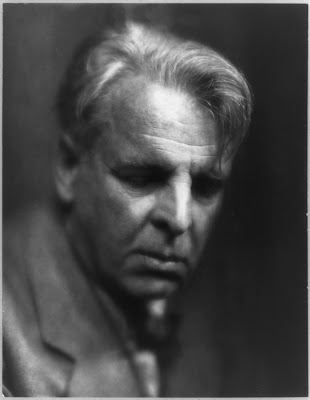I also read some Yeats, and Ted Hughes - and quite enjoyed this. As someone who briefly, and not lucratively, cast people's astrological birth charts for a living, I am interested in how astrology has influenced poetry.
W.B. Yeats was of course interested in all things occult. For example on honeymoon he forced his wife Georgie to conduct bouts of automatic writing: to go into trances and channel spirits and write down what they said. Bizarrely, the results were used as source material for a book of occult systems called A Vision. A Vision's systems are essentially quite astrological. There are houses, and a circle and so on, like astrological charts.
What is truly amazing was that these theories formed the foundation for his brilliant later work, for which he justly won the Nobel Prize.
Ted Hughes was also obsessed. The posthumously-published The Birthday Letters is stiff with astrology, and he timed the release of his books to coincide with favourably aspected days. Even a poem about the Queen Mother during his spell as Poet Laureate was astrologically motivated.
Whether Astrology is bunk or not, what is interesting to me is that Yeats and Hughes (and others too) found the wealth of symbolism in the subject to be stimulating and useful to their poetry. The symbolism is very rich. Take the symbol of Pisces, for example. In it two fishes are bound together at the mouth by a single cord. This is sometimes described as the cord of human limitation, and one of its interpretations is that it prevents two halves of the personality from going their own way and the identity being lost. Quite an image.
The symbolism is fascinating, but I am quite ready to admit it is all bunk. However the standard refutations of astrology are infuriating. For example Theodor W Adorno's famous essay called The stars look down to earth, looks at a daily astrological newspaper column and people's credulity in believing in it. Right off the bat it is clear that the person who writes this column Adorno is examining has no knowledge of astrology, and is not an astrologer, which a child can see invalidates the entire argument. Undeterred by this Adorno then goes on to equate the irrational belief in astrology with belief in totalitarian governments. And barking assertions like this: "Indulgence in astrology may provide those who fall for it with a substitute for sexual pleasure of a passive nature."
The essay cleverly proves that the astrology done by a person who is not an astrologer is bunk. This is then taken to imply that astrology is bunk, which a child of six could see simply does not follow.
Don't get me wrong, much of what purports to be astrology is 100% drivel.
But the symbolism, grounded in thousands of years of human tradition, has become a storehouse of archetypes. And this is worth exploring.
Saw an intelligent programme on TV last night called Extreme Pilgrim where a Church of England Vicar called Peter Owen Jones visited Shoalin monks of central China. He didn't seem to have the first idea of Buddhism but it was an engaging and intelligent programme - and once he began to get it a bit, quite moving. When the master showed him how to sweep the floor in a mindful way, this whistled completely over Owen Jones's head. He simply could not understand that this was a form of meditation in itself - by focusing on the job at hand of sweeping he would be emptying his mind and bringing his mind and body into one. But he is clearly a good guy and well worth watching - and, equally clearly, something happened to him when he was high in the mountains which reframed his worldview.
Below William Butler Yeats, to this day still my favourite poet.

Comments